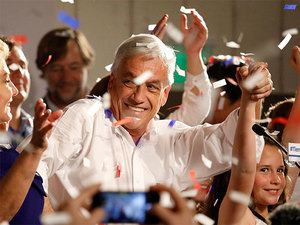SANTIAGO, Nov 20, 2017 (BSS/AFP) – Billionaire businessman Sebastian Pinera was the clear leader with more than half the votes counted in a presidential election in Chile on Sunday that will go to a runoff second round next month.
The conservative candidate polled 36.6 percent of the vote, officials said, ahead of Alejandro Guillier, an independent supported by President Michelle Bachelet’s Socialist party, and far-left candidate Beatriz Sanchez, who were battling for second place.
Official results were expected later Sunday.
Pinera, a 67-year-old billionaire who was president from 2010 to 2014, had been the clear favorite going into Sunday’s first round. The second round is set for December 17.
Guillier, a 64-year-old former state TV anchor turned senator, was a distant second in opinion polls coming into the election.
He held a narrow lead over Sanchez — 22.6 percent to 20.4 percent — with more than 50 percent of votes counted.
“Chileans are going to make a decision that will affect our lives for many decades,” said Pinera as he cast his vote in the capital Santiago after an uneventful campaign tainted by voter apathy.
– Voter apathy –
Bachelet, who was also Chile’s first woman president, hugged and took photographs with female supporters before casting her ballot in Santiago.
“It is important that people come out and vote (for a candidate) because they feel they represent what they want for Chile,” she said, predicting a second round. .
As he headed to a Santiago polling station, Fernando Aravena, 76, said: “We need change. That’s the idea.”
Daniel Concha, a 31-year-old psychologist, said it was “very likely” that Pinera would win the election.
Paula Salas, 35, said she voted for Sanchez.
“If she became president, she would do more, because she has less links with the powerful class,” Salas said.
Lawyer Cristian Barros cautioned against a Pinera victory being seen as a foregone conclusion.
“There were several former presidential candidates in Chilean history who were considered winners, and I think Pinera should not be given as a winner until the end of the election,” said Barros, 37.
Chile’s constitution bans consecutive terms for presidents, but re-election after skipping a term is permissible.
Bachelet herself led the conservative South American country — Latin America’s fifth-largest economy — from 2006 to 2010 and then was re-elected to replace Pinera in 2014.
Compulsory voting was dropped in 2012. Since then, a growing number of Chile’s 14 million eligible voters have decided to stay away from voting booths.
On the other hand, it is the first poll in the country’s history that includes expatriate citizens.
– No majority? –
Pinera’s first presidential victory in 2009 elections signified a break from the center-left politics that had reigned in Chile since democracy was restored with the end of Augusto Pinochet’s dictatorship in 1990.
But a Pinera comeback is not seen as a rejection of the overall economic and social model erected in the Bachelet years, during which Chile posted annual growth of 1.8 percent and passed tax and labor reforms, as well as introduced free education and the right to abortion.
“Chileans don’t want to tear down the model, just fix its structure,” said political analyst Mauricio Morales of Talca University.
Pinera has promised modifications to Bachelet’s reforms, and vowed to have Chile join the club of developed nations within eight years.
His effectiveness, though, could be hobbled by a shortfall in legislative support.
“He is not going to have a majority in Congress,” predicted analyst Marta Lagos, founder of Latinobarometro and MORI Chile.
Sunday’s balloting also included legislative elections for many congressional seats.
Electoral forecasts suggest the right will increase its representation, but will probably not have the majority in either chamber.



